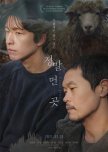This review may contain spoilers
Many films tell stories. Few, however, ask questions. (my opinion)
A Distant Place belongs to the latter category. And perhaps this is why so many viewers come away unsettled: they expect a linear drama, a love that either endures or breaks, a definite conclusion. But Park Kun-young chooses another path: he leaves gaps open, lets silence speak, and offers not answers but possibilities.
At first, it looks almost like a pastoral dream: Jin Woo, a sheep farmer, lives in the countryside with young Seol, whom he has raised like a daughter, and with Hyun Min, his partner and lover. Their daily life is made up of small gestures, glances, quiet routines. Everything seems stable, as though distance from the city might shield them from the pressures of the outside world. But this peace is fragile, and the return of Jin Woo’s sister to reclaim the child reopens wounds that had never fully healed.
And here the questions begin. What is a family? Is it the one you’re born into, or the one you choose? Is it truly possible to protect those you love, or will life always find a way to take them from you? There is no clear answer, because each character embodies a different part of this tension. The sister who wants her daughter back is not simply an antagonist, but also a mother reclaiming her role; Hyun Min is not just a wounded lover, but a man challenging his partner’s immobility.
The film works through symbols. The little girl and the grandmother, often shown together, represent the beginning and end of life coexisting in the same space. The sheep, especially the newborn lamb at the end, symbolize birth, fragility, and hope that persists despite pain. And the farmer’s words, reminding Jin Woo of the meaning of staying, weigh against his desire to leave. Every scene suggests that life is never a single direction, but a constant oscillation between opposites: leaving or staying, holding on or letting go, belonging or separation.
Many interpret the argument between Jin Woo and Hyun Min as a definitive breakup. I don’t see it that way. There is no farewell, only hurt expressed in harsh words, as often happens in relationships when anger takes over. It isn’t an ending, it’s a suspended fracture — unresolved, left hanging. In the end, we don’t know whether Jin Woo will follow his sister with Seol, seek out Hyun Min, or remain in the countryside. What we are left with is an open ending that resolves nothing but instead hands us a question: “Where do we truly want to be, to belong — and what does that mean?”
And this is why A Distant Place became a film I loved deeply. Not because it comforts, but because it dares to leave us in uncertainty. It doesn’t narrate abandonment; it reveals the difficulty of choosing, the fear of staying, the weight of love when it isn’t enough to guarantee stability. It is a film that doesn’t shout, doesn’t explain, never fully reveals itself: it remains distant, as its title suggests, and in that distance it forces us to look inward.
This, I believe, is why many viewers expect too much and walk away disappointed: they look for certainty, closure, a moral. I instead found in its openness, its symbols, and its silences a deeper truth: life rarely provides definitive answers, only possibilities we must learn to inhabit. And A Distant Place reminds us that between leaving and staying, between attachment and absence, between birth and ending, what matters is not the answer but the question we carry with us.
At first, it looks almost like a pastoral dream: Jin Woo, a sheep farmer, lives in the countryside with young Seol, whom he has raised like a daughter, and with Hyun Min, his partner and lover. Their daily life is made up of small gestures, glances, quiet routines. Everything seems stable, as though distance from the city might shield them from the pressures of the outside world. But this peace is fragile, and the return of Jin Woo’s sister to reclaim the child reopens wounds that had never fully healed.
And here the questions begin. What is a family? Is it the one you’re born into, or the one you choose? Is it truly possible to protect those you love, or will life always find a way to take them from you? There is no clear answer, because each character embodies a different part of this tension. The sister who wants her daughter back is not simply an antagonist, but also a mother reclaiming her role; Hyun Min is not just a wounded lover, but a man challenging his partner’s immobility.
The film works through symbols. The little girl and the grandmother, often shown together, represent the beginning and end of life coexisting in the same space. The sheep, especially the newborn lamb at the end, symbolize birth, fragility, and hope that persists despite pain. And the farmer’s words, reminding Jin Woo of the meaning of staying, weigh against his desire to leave. Every scene suggests that life is never a single direction, but a constant oscillation between opposites: leaving or staying, holding on or letting go, belonging or separation.
Many interpret the argument between Jin Woo and Hyun Min as a definitive breakup. I don’t see it that way. There is no farewell, only hurt expressed in harsh words, as often happens in relationships when anger takes over. It isn’t an ending, it’s a suspended fracture — unresolved, left hanging. In the end, we don’t know whether Jin Woo will follow his sister with Seol, seek out Hyun Min, or remain in the countryside. What we are left with is an open ending that resolves nothing but instead hands us a question: “Where do we truly want to be, to belong — and what does that mean?”
And this is why A Distant Place became a film I loved deeply. Not because it comforts, but because it dares to leave us in uncertainty. It doesn’t narrate abandonment; it reveals the difficulty of choosing, the fear of staying, the weight of love when it isn’t enough to guarantee stability. It is a film that doesn’t shout, doesn’t explain, never fully reveals itself: it remains distant, as its title suggests, and in that distance it forces us to look inward.
This, I believe, is why many viewers expect too much and walk away disappointed: they look for certainty, closure, a moral. I instead found in its openness, its symbols, and its silences a deeper truth: life rarely provides definitive answers, only possibilities we must learn to inhabit. And A Distant Place reminds us that between leaving and staying, between attachment and absence, between birth and ending, what matters is not the answer but the question we carry with us.
Was this review helpful to you?













